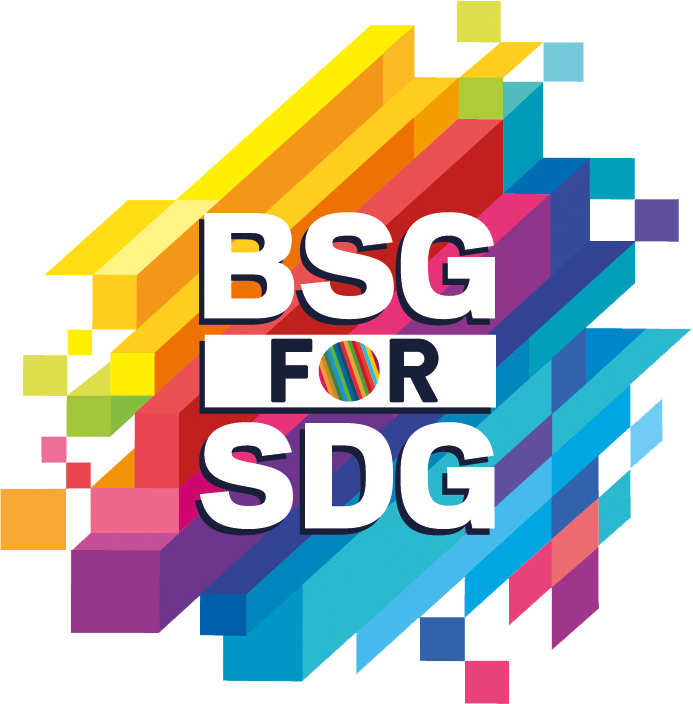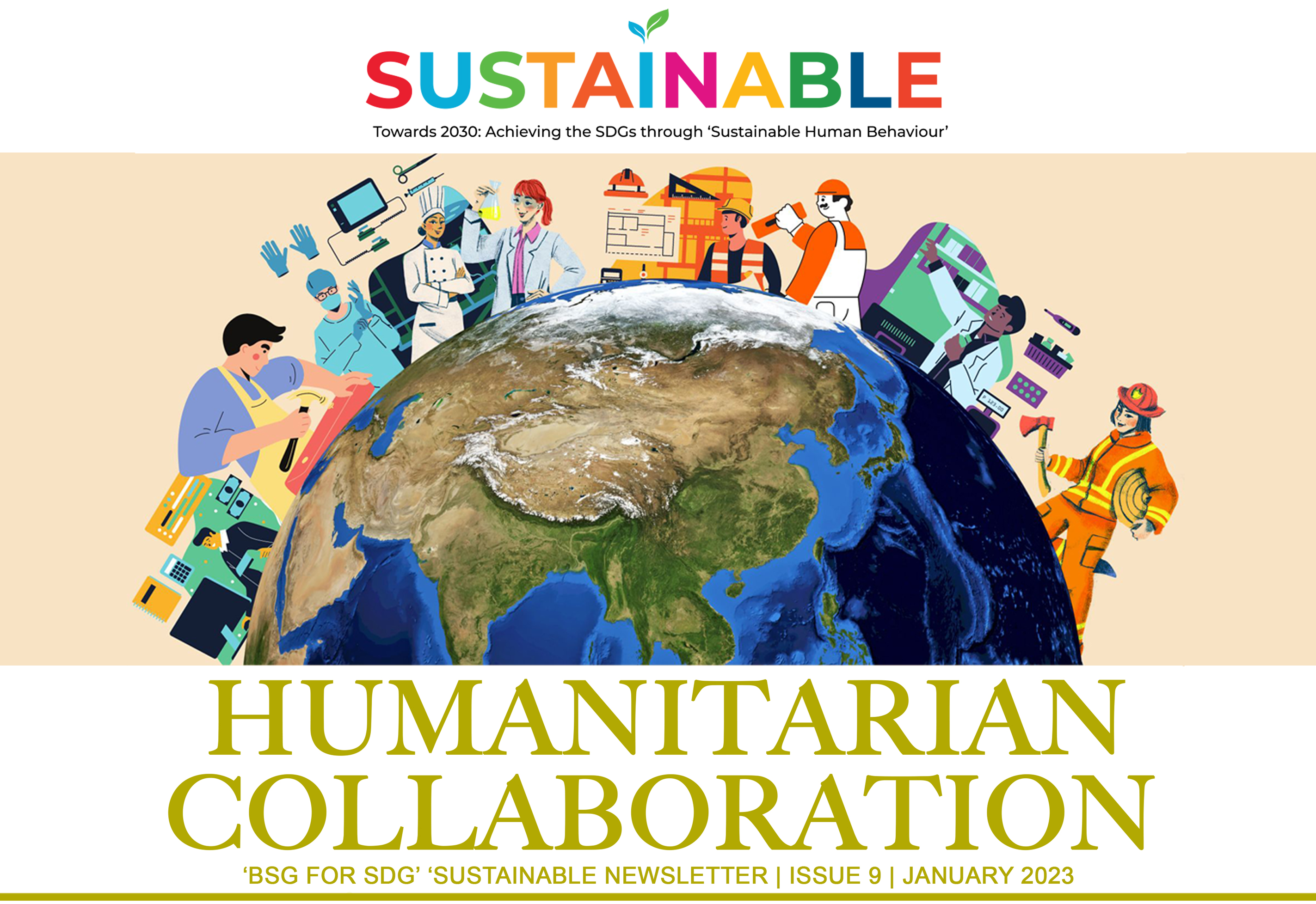
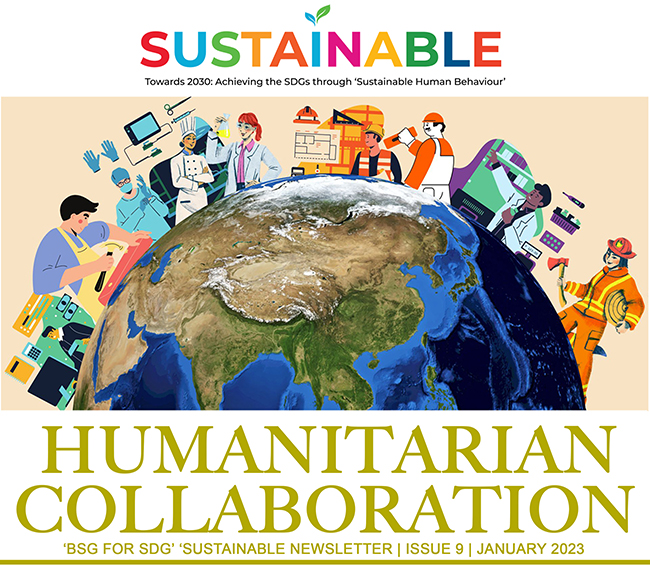
Greetings from BSG Chairperson Mr. Vishesh Gupta
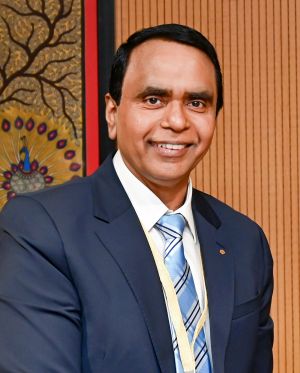
Dear Readers,
My heartfelt wishes to you and your family members on the new year. I hope you and your loved ones are doing well and thriving.
The past eight years have been the warmest on record; many parts of the world experienced record- breaking heat-waves and floodings; global military expenditure reached an all-time high of $2.1 trillion pushed by the war in Ukraine. It is evident that achieving growth and development sustainably and inclusively is no longer a moral imperative; it is an existential necessity. All the 16 SDGs are highly integrated in nature, the success and failure of one affects the others, thus necessitating collaboration amongst people themselves, whether they represent communities, businesses, or governments. This is the essence of SDG17: Partnership for the Goals. India’s G20 Presidency, inspired by the theme of ‘Vasudhaiva Kutumbakam’, comes at a critical juncture of mounting financial vulnerabilities and heightening geopolitical tensions, and could pose an opportune moment for building international solidarity and collaboration to advance a just and inclusive global development agenda.
In keeping with this spirit, the ninth edition of the ‘SUSTAINABLE’ newsletter focuses on fostering a global culture of humanitarian collaboration for achieving the global development goals. The word ‘humanitarian’ here broadly refers to reducing suffering and improving the lives of people anywhere, and is not limited to emergency or armed conflict settings. Forging such collaborations at a global scale demands a tectonic shift from a zero-sum mindset to one which cherishes the value of collaborative problem solving and collaborative gains. At an individual level, it calls for a transformation of our current worldview which perceives reality in the form of binaries of ‘us’ vs ‘them’, ‘good’ vs ‘evil, ‘black’ or ‘white’, thus ‘othering’ those who are different from us. The challenge is to look beyond our differences and find a common ground, and make a shared commitment to create something of lasting value.
We hope you will draw hope and be inspired to forge more value creating collaborations that uphold the principle of ‘leaving no one behind’. I look forward to hearing your views and experiences of how you are actualising this in your daily life.
Warm Regards
Vishesh Gupta
BSG Chairperson
The Only Way to Achieve the 17 SDGs
The COVID-19 pandemic has had a snowballing effect on public health, economy, social equity, gender equality, youth unemployment and education crises around the world. The war in Ukraine which began in February 2022, has escalated the global military expenditure to an all-time high of $2.1 trillion (SIPRI, 2022), upending the fragile economic recovery from the pandemic, pushing up global prices of fuel, food, fertiliser etc., besides threatening the progress made towards disarmament. These unprecedented, complex challenges call for strong international collaboration to arrive at inclusive, sustainable and integrated solutions which benefit everyone, while prioritising the needs of the most vulnerable.
SDG 17 urges all countries to strengthen the means of implementation and revitalise the Global Partnership for Sustainable Development. It advocates for effective public, public-private and civil society partnerships, for bringing about global macroeconomic stability and the need to mobilise financial resources for developing countries from international sources, as well as through strengthened domestic capacities for revenue collection.
Forging such collaborations at a global scale demands a fundamental shift from a zero-sum mindset to one which values collaborative gains. Against this backdrop, it would be germane to revisit the concept of ‘humanitarian competition’ as propounded by Japanese educator and Soka Gakkai Founding President Mr Tsunesaburo Makiguchi (1871-1944).
Mr Makiguchi questioned the underlying logic behind economic competition that existed between countries of the world, and how it led to exploitation of the weak for personal gain. He advocated a new form of competition that could be fundamentally recast in a nonviolent mode of mutual striving for excellence. He termed this “humanitarian competition” and suggested that as the historical possibilities of military, political and economic competition exhausted themselves, this form of competition would take a central place in human affairs. He saw this shift as not merely representing a change in the venue or form of competition, but a qualitative transformation, from a winner-takes-all style of competition, to one conducted within a consciously acknowledged framework of cooperation, what today might be called a “win-win” mode of competition.
Mr Makiguchi explains:
“There is no simple formula for this humanitarianism. Rather, all activities, whether of a political, military or economic nature, should be conducted in conformity with the principles of humanitarianism. What is important is to set aside egotistical motives, striving to protect and improve not only one’s own life, but also the lives of others. One should do things for the sake of others, because by benefiting others, we benefit ourselves. This means to engage consciously in collective life.” [1903]
SGI President Daisaku Ikeda shares further on the concept of ‘humanitarian competition’ in his 2008 Peace Proposal – “This was a vision of an international order in which the world’s diverse states strive to positively influence each other, to coexist and flourish together rather than pursuing narrowly defined national interests at each other’s expense. I feel that the work of solving the global environmental crisis provides a unique opportunity to move toward such a world.”
India’s G20 Presidency, with its theme of “One Earth, One Family, One Future” or ‘Vasudhaiva Kutumbakam’, could be viewed as a reflection of this concept as it aims to build multilateral collaboration on issues of shared concern ranging from green economy, climate finance, accelerated achievement of SDGs, digital transformation, and Disaster Risk Reduction (DRR). It also gives hope to countries from the global south to voice their concern and influence the global development trajectory through their opinions and experience.
The establishment of the COVAX facility in April 2020 to ensure rapid and equitable access to COVID-19 vaccines across the globe is another good example of global development collaboration. COVAX is coordinated by GAVI, the Vaccine alliance (which consists of the World Health Organization, UNICEF, the World Bank and the Bill & Melinda Gates Foundation and other partners), together with the Coalition for Epidemic Preparedness Innovations (CEPI) and the World Health Organisation (WHO). The ‘Grand Bargain’, launched in May 2016, is a collaboration between some of the largest donors and humanitarian organisations to close the humanitarian financing gap. The ‘Great Green Wall Initiative’, which was launched in 2007 by the African Union, aims to restore the continent’s degraded landscapes and transform millions of lives in the Sahel. It is being implemented across 22 African countries and will revitalise thousands of communities across the continent. It brings together African countries and international partners under the leadership of the African Union Commission and the Pan-African Agency of the Great Green. Lastly, in the field of disaster risk preparedness and reduction, the Private Sector Alliance for Disaster Resilient Societies (ARISE) was established by the United Nations Office for Disaster Risk Reduction (UNDRR) to encourage public private collaboration to improve disaster preparedness and disaster resilience (United Nations, 2019).
These examples reinforce the role of innovative, inclusive collaborations at the global, regional, national and local levels to mobilise and share knowledge, expertise, technologies and financial resources for achieving the global development goals. A strong commitment to leaving no one behind is seminal in realising value creating collaborations at a global scale.
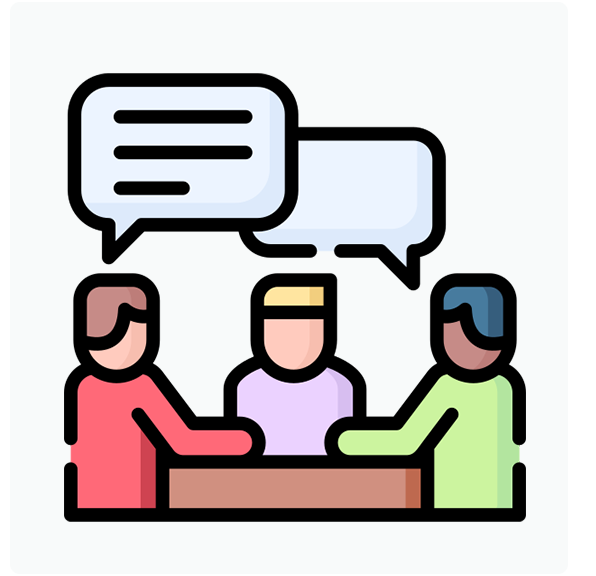
Common Ground
Common ground refers to a basis of mutual interest or agreement in any discussion or dialogue. Arriving at a common ground is an important first step in order to resolve a conflict.
Each of us has a unique way of looking at reality, which gives rise to different opinions and viewpoints. Often, this gives rise to conflict which if not addressed, may lead to deterioration of relationships and practical functionings.
Arriving at a common ground doesn’t mean agreeing to everything, but there are overlapping interests, which allows for a common ground. Let’s suppose, a family wants to decide on a holiday destination. There are varying opinions to choose from – beach, mountains or a luxury staycation. The common ground is that everyone wants a refreshing and invigorating holiday. The final decision can be made after discussing various factors such as time, available funds, travel and accommodation availability, fitness level of each member etc.
Engaging in open, sincere dialogue with empathy is crucial in understanding the other’s point of view and arriving at a common ground. It requires a relentless commitment to keep the channels of dialogue and communication alive.
At the heart of ‘humanitarian collaboration’ is the spirit to arrive at a common ground, keeping in mind the mutual interests of all parties involved. When all societies of the world think about solutions that will benefit entire humankind, it is then that path breaking innovations happen, which ensure that no life is left behind. This is also the core spirit behind the 17 SDGs.
 To Read
To Read
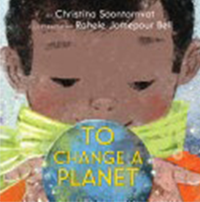
‘To Change a Planet’ by Christina Soontornvat
Through this book the author emphasises on the fact that though one person might seem small, quite insignificant, but when we come together and decide that climate change is important and we unite to take action, then we can also make a big impact and change our planet for the better.
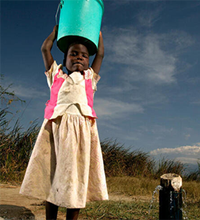
Partnership for People Stories
An inspiring collection of real life stories by the World Wildlife Fund (WWF) highlights the role of community-based partnerships in solving pressing local challenges.
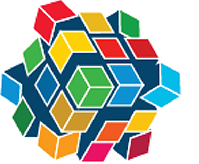
Partnering to Maximise SDG Impact
A learning module that emphasises the importance of realising the connections between themes and targets across SDGs and the significance of partnerships in accomplishing SDGs. It also states the benefits of partnering for collaborative advantage for all multi-stakeholders.
 To See
To See
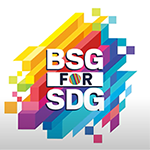
BSG for SDG app
Here is a short video on the ‘BSG for SDG’ app. Understanding the significance of collective action and collaboration, Bharat Soka Gakkai (BSG), an organisation dedicated to ‘empowering individuals’ has launched the ‘BSG for SDG’ mobile application. It enhances our knowledge and understanding of the 17 SDGs and also provides a platform to upload our actions towards a sustainable living and inspire others towards accomplishing the SDGs together.
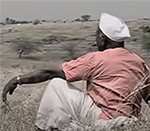
The Miracle Water Village
The Miracle Water Village is a short film by award winning production agency, Black Ticket Films, about an impoverished farming community that came together, took collective action and changed the destiny of their drought prone village Hiware Bazar in Maharashtra, India.
 To Listen
To Listen
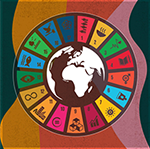
As we realise the interconnectedness and the interrelatedness of the 17 SDGs, partnerships and collaborations play a pivotal role in binding them together. We cannot accomplish one goal at the cost of the other. The ‘Power of Global Partnerships’ highlights the need for everyone to come together in attaining SDGs by 2030.
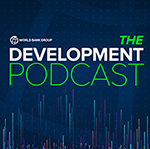
The ‘International Development Podcast’ by the World Bank Group brings together the data, research, and solutions—that can pave the way to a sustainable future. The podcasts bring forth stories and conversations with people from around the world who are helping build a better world.
 To Play
To Play
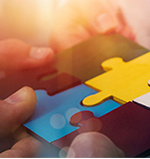
Quiz time with ‘BSG for SDG’!
Let us learn about the spirit of Partnerships for the Goals through this fun quiz on SDG 17.

Linking the SDGs
This fun game brings forth the interconnectedness of all 17 SDGs. It highlights how one goal impacts other goals and how collaboration plays a key role in accomplishing them.
Requirements: This game requires a minimum of 18 people or 17 teams and 1 mediator. Additionally, a jute string roll and 17 placards which mention each of the 17 SDGs in each individual placard will also be required.
How to play: Each of the 17 individuals/teams hold one placard which mentions one of the 17 SDGs. The mediator then gives one end of the jute string roll to any one individual/team, and asks them – which SDG do you think your goal is connected with? The individual/team holding the placard shares another SDG and the mediator takes the string roll from the first person to the next, asking the next person to hold the string roll, and then asks the same question to them. This activity is repeated until all individuals/teams are collectively holding the jute string roll and all 17 SDGs have been covered at least once.
This shows the interconnectedness of all goals. Further we can ask any one to leave the string and everyone can witness a collapse of the entire set up – suggesting all goals are important and interconnected to each other. If one goal fails, then all other goals also get impacted. Therefore, we need collaboration and partnership for the goals.
When future generations look back at this time, how would we like them to remember it? History may be demarcated into pre- and post-COVID periods, but as we embark on a new year, three years into this crucial decade towards 2030, which is the target year for achievement of the SDGs, it is important to highlight the key role that we humans ourselves will play in determining the direction of history and not a virus. SGI President Daisaku Ikeda highlights in his 2022 Peace Proposal the following realisations of connectedness that many people have come to as a result of the pandemic:
●“That our lives are not possible without the support of many others and the proper functioning of society, and that the deeper joys of life are realised through our connections with others.”
●“That the problems of the world are deeply and mutually connected; threats and challenges besetting people in distant places will quickly find their way to our local communities.”
●“That the grief of suddenly losing family members or being shut out from the things that give meaning to life is the same for people in any country, and that while the specific circumstances may vary, the tragedy is in its essence the same.”
Based on these realisations, we must then forge even greater solidarity and make shared efforts to change the course of history. None of the SDGs can be achieved without collaboration amongst people themselves, whether they represent communities, businesses, or governments. This is the essence of SDG17: Partnership for the Goals.
In fact President Ikeda also highlights in the 2022 Peace Proposal how this spirit of collaboration needs to extend to the entire world. No doubt that the pandemic created a shared sense of crisis within nations, however the scale of international cooperation has been inadequate – this was evident when it came to vaccine access across countries. Through the example of response measures taken for COVID-19, President Ikeda throws light on the fact that global challenges require governments to work together, and not only focus on how each individual country can escape such challenges.
He further draws attention to the following teachings of Buddhism: “When one lights a torch for someone at night, one brings light not only to another person but to oneself as well. Likewise, when one livens other people’s complexions, one livens one’s own too, when one gives them strength, one gives oneself strength too, when one prolongs their lives, one prolongs one’s own life as well.”
Through sharing this he says, “When this kind of virtuous cycle is generated from a shared concern for both self and others, and as more countries take up the work of cooperation and assistance, it will help drive away the mounting gloom. This is the path toward establishing a consciousness of global solidarity.”
What does this mean at the individual level? While the 17SDGs include 169 targets, and we may wonder if these are actually achievable, in his 2017 Peace Proposal, President Ikeda reminds us that “…..the large number of targets speaks to the vast number of people facing gravely challenging conditions, none of which we can afford to overlook.” And expressing the need for building solidarity to achieve the SDGs he shares, “The key to dealing with even the most seemingly intractable challenges is to be found when people come together and continue to do all in their power for the sake of others.”
Highlighting the power that people themselves possess, President Ikeda says, “Everything in our lives, far from being immovably determined, can be transformed for the better through our actions in this moment. In this way, Buddhism teaches that a change in our inner determination in this moment can change the present reality of our lives (Jpn: in; cause) that produces future outcomes (Jpn: ka; effect). At the same time, it emphasises the critical importance of conditioning context (Jpn: en; relation) that can powerfully shape the interplay between cause and effect. In other words, depending on the context of the relations that are formed, the same cause can give rise to widely varying effects. From this perspective, Buddhism encourages a way of life in which, upholding powerful confidence in the dignity and possibilities of life, we form relations of mutual encouragement and fellowship with those who are on the verge of losing hope.” (2017 Peace Proposal)
President Ikeda further shares, “None of the SDGs will be easy to achieve. But through maintaining empathetic connections with those who struggle and dedicating ourselves to the work of empowerment, each of us should be able to cause a flower to bloom in our immediate surroundings.” (2017 Peace Proposal) Thus humanitarian collaboration towards a hope-filled future starts with each one of us developing such empathetic connections with those struggling in our immediate environment.
Participatory and Community-Based action for Humanitarian AidDr. Pranab J Patar | Men’s Division | Delhi
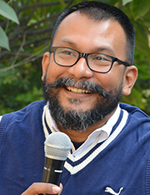
Nelson Mandela once remarked: “A fundamental concern for others in our individual and community lives would go a long way in making the world the better place we so passionately dreamt of.”
Mainstreaming action for sustainability is the key towards achieving sustainable development in the truest sense. Though the process of mainstreaming appears to be somewhat difficult, it is not impossible to achieve. There are multiple ways through which we can apply the principle of sustainable development in our daily lives both in personal and professional spheres.
Having been born in the state of Assam, at least two things got ingrained in me naturally – first – a special affinity towards nature and second – a deeper understanding of natural calamities, especially floods. And along with the nuances of caring for & protecting our environment and the ability to survive natural disasters got enhanced too.
I have experienced floods from a close quarter while growing up, at times as a spectator, occasionally as a survivor and often as a relief provider. On multiple occasions, our home would get inundated by floodwater, could witness the challenges faced by people in the neighbourhood and would often accompany my father, who is a medical practitioner, during his visits to flood-affected areas on Indian Army boats and later as a grown-up, participated in /conducted animal rescue operations for wildlife affected by devastating floods. One thing that became very clear was that people supported one another and collaborated to survive and overcome these calamities year on year. Disasters always help break the shackles of caste, creed, gender, ethnicity, colour and even language barrier.
When COVID-19 pandemic hit us 2 years ago, I was at my wit’s end. Even as an environmental practitioner with over 2 decades of experience in the nonprofit sector and having led projects on environmental sustainability, I could never imagine how the COVID-19 relief activities could contribute towards Agenda 2030. Taking inspiration from my mentor – SGI President Daisaku Ikeda’s writings, I determined to remain undefeated and to create value in the midst of this grave situation. Besides participating in relief activities as an individual volunteer, I guided our foundation to take a plunge into humanitarian aid operations by walking an extra mile in order to holistically embrace these efforts along with the core areas of work, that are climate action, ecosystem restoration, water conservation, food & nutrition, as the situation around us deteriorated drastically as a result of COVID-19 pandemic.
Despite facing severe fund crunch due to resources getting diverted to address non-environmental humanitarian aid efforts, especially health scares created by COVID-19 and provisioning for food, livelihood and vaccination, we managed to accomplish daunting goals. Our secret – we joined hands with several like-minded people and organisations including active citizen’s collectives of the Noida region, Residents Welfare Associations and high rise apartment complexes, NGOs, COVID Action Colab (India’s largest consortium of NGOs working for COVID relief operation, ACT Grants (funding platform developed specifically to aid projects to address COVID-19 impact), private companies as well as National Institute of Disaster Management. Some of our initiatives included the creation of a Medicine Bank to provide medicines and oxygen concentrators free of cost (worth over INR 7 lakhs) to hundreds of needy people during floods of Assam & Bihar, Ration Aid (approximately 1.5 tons) for people from economically weaker section of the society, mask-up drive which distributed 50,000 face masks (N95 & cloth masks) free of cost to front-line health workers and the needy across Uttarakhand, Uttar Pradesh and Madhya Pradesh. In addition, we actively participated and contributed to the community led Roti Bank initiative of Noida that mobilised and collectively distributed over 1.8 million pieces of Indian Bread to people stranded during two-month long lockdown in the year 2020.
These initiatives simultaneously impacted several SDGs namely SDG 2: Zero Hunger (provisioning food/ration) | SDG 3: Good health and well-being (medicines and masks) | SDG 5: Gender Equality (engagement of jobless women in mask-making initiative) | SDG 8: Decent Work and Economic Growth (creation of alternative livelihood for those lost their jobs during COVID-19) |SDG 17: Partnerships for the Goals (series of partnerships and collaborations with individuals as well organisations/groups of various shapes and sizes).
Along the way we have learned to become more innovative, resilient and empathetic enough to improvise ideas and take spontaneous actions for social upliftment. Although, the circumstances demanded more, with our limited capacity and practically no financial resource to undertake any relief activity, whatever little we could do for the well-being of our fellow humans, deliver humane yet seemingly impossible results.
Developing my own life by supporting others to grow Parth Suri | Young Men’s Division | Delhi
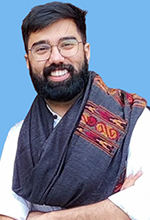
As a student in my college years, I was deeply inspired by the words and efforts of SGI President Daisaku Ikeda to promote peace, culture and education. I was particularly encouraged by the discussions in his annual peace proposals which helped me gain a new perspective on the challenges facing humanity as well as honing my own ability and expanding my outlook as a student. I developed great interest and passion towards social development and decided to use my knowledge and skills towards addressing the developmental issues facing our world.
Presently, I work with an NGO as a co-lead in the space of skilling and entrepreneurship development. In alignment with UN Sustainable Development Goal 8, we have been working on holistic development of the Indian workforce empowering them with the right knowledge, skills and attitude to be future-ready and well-equipped to lead the 21st century work landscape.
Over the last 5 years, we have designed content and capacity building programs for more than 70,000 participants including disadvantaged and marginalised youth, vocational courses students, rural women entrepreneurs, NGOs and corporate employees as well as teachers and trainers.
Working with groups from such diverse socio-economic backgrounds, cultures, gender, age and geographies has enriched my life in more ways than I can imagine. It has time and again made me experience the deep human connection we share and our collective power to work towards a better future.
While working on a range of themes like education, livelihood, gender, sexual and reproductive health and youth development, I studied continuously to deepen my own knowledge and expand my skill set. To showcase our impact in the sector and build support for our work, I wrote an article for the national daily ‘The Times of India’, titled ‘Youth Centric Lens to 21st Century Skills Education’ and co-authored a white paper titled ‘21st Century Skills: Implication for Skills Development Programs’. In addition to this, I also represented India as a Youth Delegate at UNICEF South Asia Youth Skills and Solutions Forum. One of my programs was also recognized by the renowned media house, NDTV India, which covered and broadcasted our on-ground effort on primetime television.
With gratitude towards the opportunities which have helped me develop my life and abilities, moving forward, I am determined to dedicate my life to creating a world where the dignity of each life is respected and where every individual is given the opportunity to give full expression to their unique and infinite potential.
 SDG Tip for Daily Life
SDG Tip for Daily Life

Read, Connect and Act!
Create your own or join a book club that focuses on learning more about our complex world, and talk to each other on how to create change in your own unique way. For instance, Read for Action: The Humanitarian Book Club is a social media initiative co-created by the Humanitarian Collaborative and the UN Office for the Coordination of Humanitarian Affairs that connects one to a global community reading powerful novels about those affected by climate, conflict & humanitarian crises. In addition to reading, through the book club you can connect with other readers, hear from authors, and engage with humanitarian experts to discuss, learn, and find ways to take action.
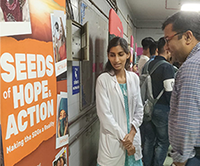
Updates
1) Bharat Soka Gakkai (BSG) organises the ‘Seeds of Hope & Action (SOHA): Making the SDGs a Reality’ exhibition at various educational institutes
The ‘Seeds of Hope & Action (SOHA): Making the SDGs a Reality’ exhibition was organised by BSG at Birla Institute of Technology And Science–Pilani, Rajasthan on 13th November, 2022 (online); Maulana Azad Medical College, Delhi on 17th November 2022 (offline); DY Patil Institute of Hospitality & Tourism Studies, Navi Mumbai on 18th November 2022 (offline); Manav Rachna International School, Faridabad on 18th-19th November 2022 (offline); Vivekananda Institute of Professional Studies, Delhi on 14th December 2022 (offline) and Soka Ikeda College for Women, Chennai on 2nd-3rd January 2023 (offline).
The exhibition is a joint initiative of Bharat Soka Gakkai (BSG) and Earth Charter International. SOHA is a 25-panel exhibition which is held across various educational institutes with the aim to spread awareness about sustainability among the younger generations; encouraging them to overcome feelings of powerlessness and highlight the fact that a single individual can initiate positive change. The SOHA exhibition raises awareness on climate change, the SDGs and the role of youth.
Read more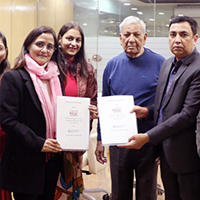
2) BSG, in collaboration with DY Patil Institute of Hospitality & Tourism Studies, Mumbai and Vivekananda Institute of Professional Studies, Delhi; formed SDG Clubs at the respective institutions
BSG signed an MoU with DY Patil Institute of Hospitality & Tourism Studies, Navi Mumbai on 28th November 2022 and with Vivekananda Institute of Professional Studies, Delhi on 27th December 2022 to launch the SDG Club in both these institutions.
The purpose of SDG Club is to promote a culture of sustainability and establish respect for the dignity of all life in society by raising the SDG Ambassadors across the younger generation who will take lead in conducting various SDG related activities.
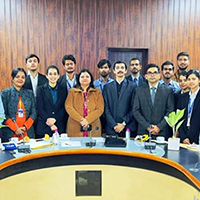
3) Representatives from BSG went to Suresh Gyan Vihar University, Jaipur to interact with the SDG Club Ambassadors of their Institute
In order to encourage the student SDG Ambassadors and further strengthen the understanding of ‘sustainable human behaviour’, BSG representatives went to Suresh Gyan Vihar University for an interactive session on 9th December 2022.
The session turned out to be quite significant in instilling ‘the power one’ among the students, who further shared their ideas and action points as their takeaways from the session.
Contact Us
 Any queries or suggestions regarding the newsletter can be addressed to sdg@bharatsokagakkai.org
Any queries or suggestions regarding the newsletter can be addressed to sdg@bharatsokagakkai.org
 To know more about the ‘BSG for SDG’ initiative, visit the BSG for SDG website
To know more about the ‘BSG for SDG’ initiative, visit the BSG for SDG website
 Download the ‘BSG for SDG’ mobile app
Download the ‘BSG for SDG’ mobile app
